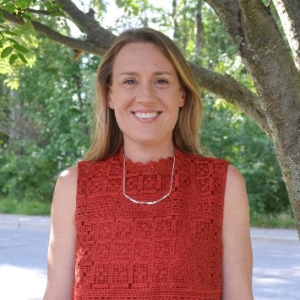
Event Details
-
Faculty: Kathryn Richardson
Session Details:
Kathryn will kick things off by welcoming everyone and preparing them for an incredible day of virtual learning!
-
Faculty: Aimee Piller
Session Details:
This session is designed to provide practical strategies to help adolescents and young adults manage stress, anxiety, and mental health challenges. It offers practical strategies, evidence-based approaches, and tools to help clients build resilience, manage anxiety, and foster overall well-being.
Participants will explore topics such as physical and social health, cognitive-behavioral strategies, and ways to create a supportive environment for clients facing increasing pressures to help their clients develop long-lasting routines to promote mental health and well-being.
-
-
Faculty: Amy C. Laurent
Session Details:
Neurodiversity? Neurodivergent? Affirming Practice? All of these words are becoming more commonplace to describe therapeutic practices, but how can an Occupational Therapist determine if their practice is truly neurodivergent affirming? This brief talk will explore the unique role of Occupational Therapy Practitioners in providing affirming, individualized support focusing holistically on neurodivergent people inclusive of all of their roles and identities.
Neurodivergence often presents as a unique constellation of priorities, strengths, and support needs. General recommendations to ensure practice addresses these qualities will be discussed for a range of neurotypes. Application of these recommendations will also be discussed in the context of case studies and the introduction of neurodivergent informed supports.
-
-
Faculty: Kathryn Richardson
Session Details:
This course provides rehabilitation professionals with a comprehensive overview of Complex Regional Pain Syndrome (CRPS), a challenging and often misunderstood chronic pain condition. Participants will explore the historical development and evolving definitions of CRPS, learn to apply current diagnostic criteria, and examine proposed pathophysiological mechanisms.
Through case-based discussion, the course will highlight key clinical features and presentation patterns. Evidence-based treatment algorithms will be reviewed, emphasizing the critical role of a multidisciplinary approach that addresses the complex biopsychosocial needs of patients. Finally, the course will introduce emerging nonpharmacological interventions, empowering providers to support optimal recovery and quality of life for individuals living with CRPS.
-
-
Faculty: Jennifer Stone
Session Details:
Pediatric voiding dysfunction is a prevalent condition, accounting for approximately 40% of visits to primary care physicians each year. Despite its frequency, it is often underrecognized in rehabilitation settings—yet Occupational Therapists are uniquely positioned to support children experiencing these challenges through a holistic, function-based approach.
In this informative and practical session, Dr. Stone will guide participants through the etiology, evaluation, and treatment of pediatric voiding dysfunction. The course will cover a range of conditions including overactive bladder, dysfunctional voiding, enuresis (bedwetting), and voiding difficulties associated with constipation and sensory regulation issues.
You do not need to be a pelvic health therapist to benefit from this session. The strategies and techniques discussed will be accessible and applicable to OTs working in schools, outpatient clinics, early intervention, and general pediatric settings
-
-
Faculty: Elizabeth A. Dixon
Session Details:
Feeding challenges are a common concern in Early Intervention (EI), but differentiating between sensory-based feeding difficulties and typical picky eating can be complex. This course is designed for occupational therapists working with toddlers and families to help clarify when feeding behaviors indicate a need for intervention.
Participants will explore the latest research on sensory processing and dietary behavior, learn to recognize key distinctions between sensory avoidance and developmental picky eating, and develop evidence-based strategies to guide their practice. Emphasis will be placed on collaborative caregiver communication and building tailored, supportive interventions that promote healthy eating habits and family well-being.
-
-
Faculty: Dustin Brett
Session Details:
This evidence-based course is designed for occupational therapists aiming to enhance their clinical skills in assessing and treating lateral epicondylitis (tennis elbow). Ideal for those working in outpatient rehab, hand therapy, or general orthopedics, the course delivers both foundational knowledge and practical tools to improve client outcomes.
We begin with a concise review of the upper kinetic chain, including bony, soft tissue, and neurovascular anatomy, to deepen your understanding of the anatomical and biomechanical factors behind this condition. The presentation then explores the etiology and mechanics of lateral epicondylitis, helping you identify contributing factors and tailor interventions accordingly.
Treatment strategies focus on conservative, occupation-based approaches, including progressive therapeutic exercise, manual therapy, and evidence-supported modalities. You’ll also gain practical skills in orthotic design and bracing for symptom relief and functional support.
In addition, we’ll cover activity modification techniques and client education strategies that empower clients to safely engage in meaningful occupations while minimizing the risk of re-injury. The goal is not only symptom resolution, but long-term performance enhancement and prevention.
-
Faculty: Kathryn Richardson
Session Details:
Kathy will close the day out with some final remarks and a resounding thank you to everyone who attended as well as the speakers who helped make it all happen!
-
Faculty: Jessica Asiello
Session Details:
Are you feeling like a cog in the wheel at your hospital and wishing you could pull up a seat at the leadership table and drive systemic change? In this 60-minute course, we will analyze the intersection of quality improvement, value-based care, and innovation within the context of acute care occupational therapy.
Participants will receive a crash course in current healthcare quality trends and how to advocate for occupational therapy’s value in achieving system-level goals such as reduced readmissions and improved patient satisfaction. Case studies will highlight specific opportunities, for example in cardiac populations. Learners will come away with specific action steps to be an agent of change in their practice.
-
Faculty: Marissa Mirecki
ALL TIMES LISTED ARE IN CENTRAL STANDARD TIME (CST)
Attendees will have access to recorded sessions for up to 6 months if they are unable to attend part or all of the live event.
Presenters
October 11th, 2025 | Register Now!
Clinician Pricing: $200
Entry Level PT/OT Student Pricing: $65
Student Pricing: $65
All registrants will have access to both live sessions and recordings for 6-months. The conference provides up to 10 contact hours.
If you have questions or have trouble registering, please contact us here.
Click Here To Purchase The Recording!
If you’re currently enrolled in an entry-level physical therapy program (working toward your OTD or MOT) and would like to take advantage of our student pricing, please email info@eimpt.com. Our team will be happy to assist you with registration.







